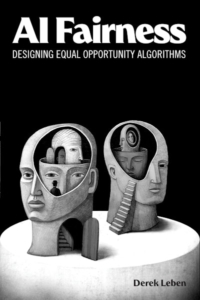As artificial intelligence takes on a growing role in decisions about education, jobs, housing, loans, healthcare, and criminal justice, concerns about fairness have become urgent. Because AI systems are trained on data that reflect historical inequalities, they often reproduce or even amplify those disparities. In his book “AI Fairness: Designing Equal Opportunity Algorithms” Professor Derek Leben draws on classic philosophical theories of justice—especially John Rawls’s work—to propose a framework for evaluating the fairness of AI systems. This framework offers a way to think systematically about algorithmic justice: how automated decisions can align with ethical principles of equality and fairness. The book examines the trade-offs among competing fairness metrics and shows that it is often impossible to satisfy them all at once. As a result, organizations must decide which definitions of fairness to prioritize, and regulators must determine how existing laws should apply to AI. In this episode of Bridging the Gaps, I speak with Professor Derek Leben.
Derek Leben is Professor of Business Ethics at the Tepper School of Business at Carnegie Mellon University. As founder of the consulting group Ethical Algorithms, he has worked with governments and companies to develop policies on fairness and benefit for AI and autonomous systems.
I begin our discussion by asking Derek what “AI” means in the context of his work and how fairness fits into that picture. From there, we explore why fairness matters as AI systems increasingly influence critical decisions about employment, education, housing, loans, healthcare, and criminal justice.
We discuss how historical inequalities in training data lead to biased outcomes, giving listeners a deeper understanding of the problem. While some view AI fairness as a purely technical issue that engineers can fix, the book argues that it is also a moral and political challenge—one that requires insights from philosophy and ethics. We then examine the difficulty of balancing multiple fairness metrics, which often cannot all be satisfied simultaneously, and discuss how organizations might prioritize among them. Derek explains his theory of algorithmic justice, inspired by John Rawls’s philosophy, and we unpack its key ideas.
Later, we touch on questions of urgency versus long-term reform, exploring the idea of longtermism, and discuss the tension between fairness and accuracy. Finally, we consider how businesses can balance commercial goals with their broader social responsibilities.
Overall, it is an informative and thought-provoking conversation about how we can make AI systems more just.
Complement this discussion with “The Line: AI and the Future of Personhood” with Professor James Boyle and the listen to Reclaiming Human Intelligence and “How to Stay Smart in a Smart World” with Prof. Gerd Gigerenzer


Connect With Us